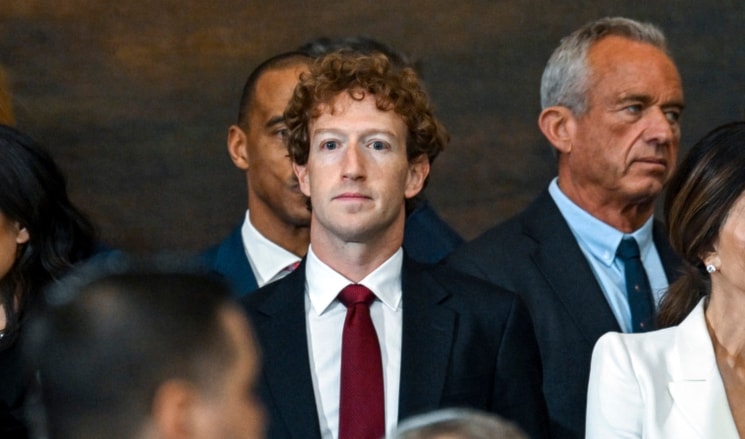US takes Meta to court over Instagram, WhatsApp acquisitions
The case comes amid heightened regulatory pressure on Silicon Valley and is one of five major antitrust lawsuits recently filed by the US government.
-

Mark Zuckerberg arrives before the 60th Presidential Inauguration in the Rotunda of the US Capitol in Washington, on January 20, 2025. (AP)
Meta is set to stand trial next week in a landmark antitrust case brought by the US Federal Trade Commission (FTC), which accuses the tech giant of using its market dominance to acquire Instagram and WhatsApp before they could emerge as serious competitors.
The trial will proceed in Washington’s federal court, barring any interventions, shattering any expectations from Meta CEO Mark Zuckerberg that Trump's return to the White House would ease government scrutiny of Big Tech.
The FTC filed the case in December 2020, during Trump’s first term, and is now pushing forward with efforts that could result in Meta being forced to divest Instagram and WhatsApp. Both platforms, acquired in 2012 and 2014, respectively, have since grown into global tech juggernauts.
The case comes amid heightened regulatory pressure on Silicon Valley and is one of five major antitrust lawsuits recently filed by the US government. For instance, Google was found guilty of abusing its dominance in the search market last August, while Amazon and Apple also face legal challenges.
Zuckerberg, ranked as the world’s third-richest person, has made several attempts to seek a settlement and avoid trial. He has reportedly visited the White House multiple times, trying to sway President Trump toward dropping the case.
FTC Chair Andrew Ferguson dismissed the likelihood of such a political move. “I think that the President recognizes that we've got to enforce the laws, so I'd be very surprised if anything like that ever happened,” he told The Verge.
Zuckerberg’s efforts have included campaign contributions to Trump’s inauguration fund and changes to Meta’s content moderation policies, which are perceived as more favorable to Republicans. Yet some experts believe those gestures may not be enough.
“I'm not sure Trump is persuaded that Zuckerberg is worthy of redemption,” said George Hay, an antitrust law professor at Cornell Law School. He added that for a White House intervention to occur, both the president and the FTC would have to agree the case lacks merit — a highly unlikely scenario at this stage.
Into the trial
The trial, expected to last at least eight weeks, will see testimony from Zuckerberg, former COO Sheryl Sandberg, and executives from rival firms. Central to the FTC’s case is Meta’s $1 billion acquisition of Instagram in 2012, then a fledgling mobile photo-sharing app.
The FTC cited internal Meta communications suggesting the acquisition was a strategic move to neutralize competition. In one email, Zuckerberg wrote, “The potential impact of Instagram is really scary and why we might want to consider paying a lot of money for this.”
The commission also argues that the $19 billion WhatsApp deal in 2014 followed the same pattern, with Meta buying out a potential rival before it could disrupt the social media landscape or be acquired by another major player.
Meta’s legal team is expected to argue that both platforms were transformed into their current forms thanks to major investments and innovation, making them fundamentally different from the startups originally acquired. They will also point out that the FTC approved both deals at the time and should not be allowed to reverse those decisions years later.
Meta could gain leverage from the FTC’s recent court setbacks, including failed attempts to block Meta’s acquisition of the VR company Within and Microsoft’s purchase of Activision Blizzard.
Judge James Boasberg, who will oversee the trial, has already signaled skepticism about the FTC’s burden of proof. He warned that the agency “faces hard questions about whether its claims can hold up in the crucible of trial.”
The trial begins on Monday and could have major implications for the future of tech regulation in the United States.
Mirroring the EU ruling strategy
Zuckerberg aligned with the new administration’s priorities by dismantling Meta’s diversity team, shutting down its fact-checking program, and adding UFC President and Trump ally Dana White to its board.
According to a Wall Street Journal report, in one of Zuckerberg’s first major requests since Trump took office, Meta executives have recently urged US trade officials to push back against an impending EU fine and cease-and-desist order, sources said.
The ruling would require Meta to offer Facebook and Instagram users an ad-free option, threatening the company’s primary revenue stream.
Meta is seeking US intervention, hoping the Trump administration—set to announce new tariffs on the EU and others—will take a tough stance, pressuring the European Commission to soften the decision.
“This is not just about fines—it’s about the Commission seeking to handicap successful American businesses simply because they’re American, while letting Chinese and European rivals off the hook,” a Meta spokesperson said.
According to the report, a European Commission spokesperson stated that EU laws are enforced equally for all companies, regardless of their country of origin.
The WSJ report suggested that Zuckerberg has spent the past year pushing back after being frustrated due to increasing European regulations, rulings, and taxes. Following Trump’s inauguration, he expressed a desire to collaborate with the administration to counter global regulations, particularly in Europe, where he claimed laws are “institutionalizing censorship and making it difficult to build anything innovative.”

 5 Min Read
5 Min Read










